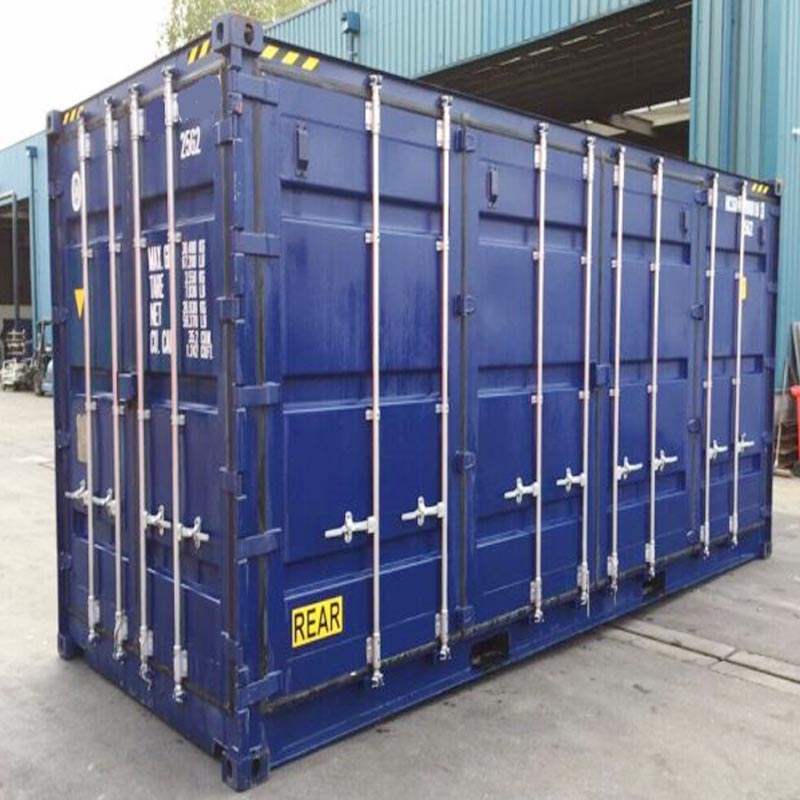Why Are Special Purpose Containers Essential for Modern Logistics and Storage?
2025-01-02
In today’s fast-paced world of global trade, manufacturing, and logistics, the need for special purpose containers has become more important than ever. Whether it's for transporting delicate goods, hazardous materials, or oversized equipment, having the right container for the job is crucial for maintaining the safety, security, and integrity of the contents.
But what exactly are special purpose containers, and why are they so important in modern industries? In this blog, we’ll explore what special purpose containers are, their various applications, and how they are transforming the way we approach storage and transportation.
What Are Special Purpose Containers?
Special purpose containers are custom-designed containers that serve specific needs or applications, beyond the standard shipping container. Unlike regular containers used for general cargo, special purpose containers are engineered to meet unique requirements based on the type of goods being transported or stored. They can be made to fit irregularly shaped items, offer specific temperature control, provide extra protection against environmental factors, or ensure compliance with strict regulations.
Examples of special purpose containers include:
- Refrigerated containers for perishable goods
- Hazardous material containers designed to safely transport dangerous chemicals
- Flat-rack containers for oversized or heavy cargo
- Tank containers for transporting liquids and gases
- Custom-designed containers for fragile or high-value products like artwork, electronics, or machinery
Each of these containers is built with specific features to ensure that the contents are protected and meet the necessary standards for transportation or storage.
Why Are Special Purpose Containers Essential?
1. Enhanced Protection for Sensitive Goods
Certain goods require extra protection during transport, especially if they are easily damaged, perishable, or sensitive to environmental conditions. For example:
- Food products: Refrigerated containers are used to keep perishable goods like fruits, vegetables, dairy, or pharmaceuticals at the correct temperature, preventing spoilage and ensuring safety.
- Electronics: Specialized containers with shockproof and anti-static properties are used to protect delicate electronics during transit.
- Artwork and antiques: Custom-built containers with climate control and padding ensure that artwork or valuable antiques are kept safe from temperature fluctuations, humidity, and physical damage.
Without these specially designed containers, transporting such goods would be risky and unreliable, potentially leading to damage or loss.
2. Safety and Compliance with Regulations
Certain industries, particularly those that handle hazardous materials, require special containers to ensure that goods are transported in compliance with national and international safety regulations. For example:
- Hazardous chemicals and fuels: These require containers made from specific materials that can withstand leakage, spillage, or combustion. Regulations like ADR (European Agreement Concerning the International Carriage of Dangerous Goods by Road) and IMDG (International Maritime Dangerous Goods) set standards for these containers to ensure safety during transport.
- Explosives and inflammables: Containers for such goods are designed to prevent accidents and ensure the integrity of the goods during transport, with features like pressure relief valves and explosion-proof seals.
Failure to meet regulatory requirements can lead to significant fines, legal consequences, or even catastrophic accidents, making the role of special purpose containers in ensuring safety and compliance paramount.
3. Efficient Storage and Transport of Oversized Items
Not all goods fit neatly into standard-sized containers, especially when transporting heavy, bulky, or oddly shaped equipment. Flat-rack containers and open-top containers are specifically designed to carry oversized cargo, such as industrial machinery, construction equipment, and large vehicles. These containers provide the flexibility to store and transport items that wouldn’t fit into regular containers.
By using special purpose containers for oversized goods, businesses can avoid the challenges of using makeshift solutions, reduce the risk of damage, and ensure that the cargo is securely fastened and stable during transit.
4. Minimizing Risk and Reducing Loss
The logistics and transportation of goods come with inherent risks. Whether it’s theft, weather damage, or mishandling, the right container can help minimize these risks. Special purpose containers are built with specific features such as:
- Tamper-proof seals to prevent theft and unauthorized access
- Weatherproofing to protect contents from rain, wind, or extreme temperatures
- Reinforced structures to prevent collapse or breakage during transit
Using containers specifically designed for the type of goods being transported significantly reduces the likelihood of loss or damage, giving businesses peace of mind and ensuring that their products reach their destination safely.
5. Cost-Effective Solutions for Specialized Needs
While special purpose containers may come with a higher upfront cost compared to standard containers, they can be more cost-effective in the long run. By using containers designed for specific tasks, businesses can:
- Reduce the likelihood of product damage, minimizing loss and the need for replacements.
- Ensure compliance with regulations, avoiding costly fines or delays in shipments.
- Improve the efficiency of their operations, as specialized containers can help streamline storage and transport processes.
In many cases, investing in specialized containers can result in overall cost savings, particularly for businesses that regularly handle sensitive or high-value products.
Industries That Rely on Special Purpose Containers
Various industries rely heavily on special purpose containers to ensure that their products are safely transported and stored. Here are just a few examples:
- Food and beverage industry: Refrigerated containers are essential for transporting perishable food and drink products, maintaining the required temperature and preventing spoilage.
- Pharmaceuticals: Temperature-sensitive drugs and vaccines are often transported in temperature-controlled containers, ensuring they remain effective until they reach their destination.
- Oil and gas: Hazardous liquids, chemicals, and gases are safely transported in tank containers that meet international safety standards.
- Construction and heavy machinery: Oversized and heavy equipment are transported in flat-rack containers, ensuring that these large items remain stable and secure during transit.
- Art and antiques: Custom-designed crates and containers protect valuable artwork and historical artifacts from environmental factors and physical damage.
By using special purpose containers, these industries can meet specific needs related to temperature control, safety, and the handling of sensitive or oversized goods.
Conclusion
Special purpose containers are an essential component of modern logistics, providing tailored solutions for transporting and storing a wide variety of goods, from perishable food and hazardous chemicals to oversized machinery and sensitive electronics. By offering enhanced protection, ensuring regulatory compliance, and reducing the risk of damage or loss, these containers play a crucial role in ensuring that goods reach their destination safely and efficiently.
As industries continue to evolve and the demand for specialized solutions grows, special purpose containers will remain a vital part of the global supply chain. Whether you are in food production, pharmaceuticals, or heavy manufacturing, choosing the right container can make all the difference in the success of your operations.



